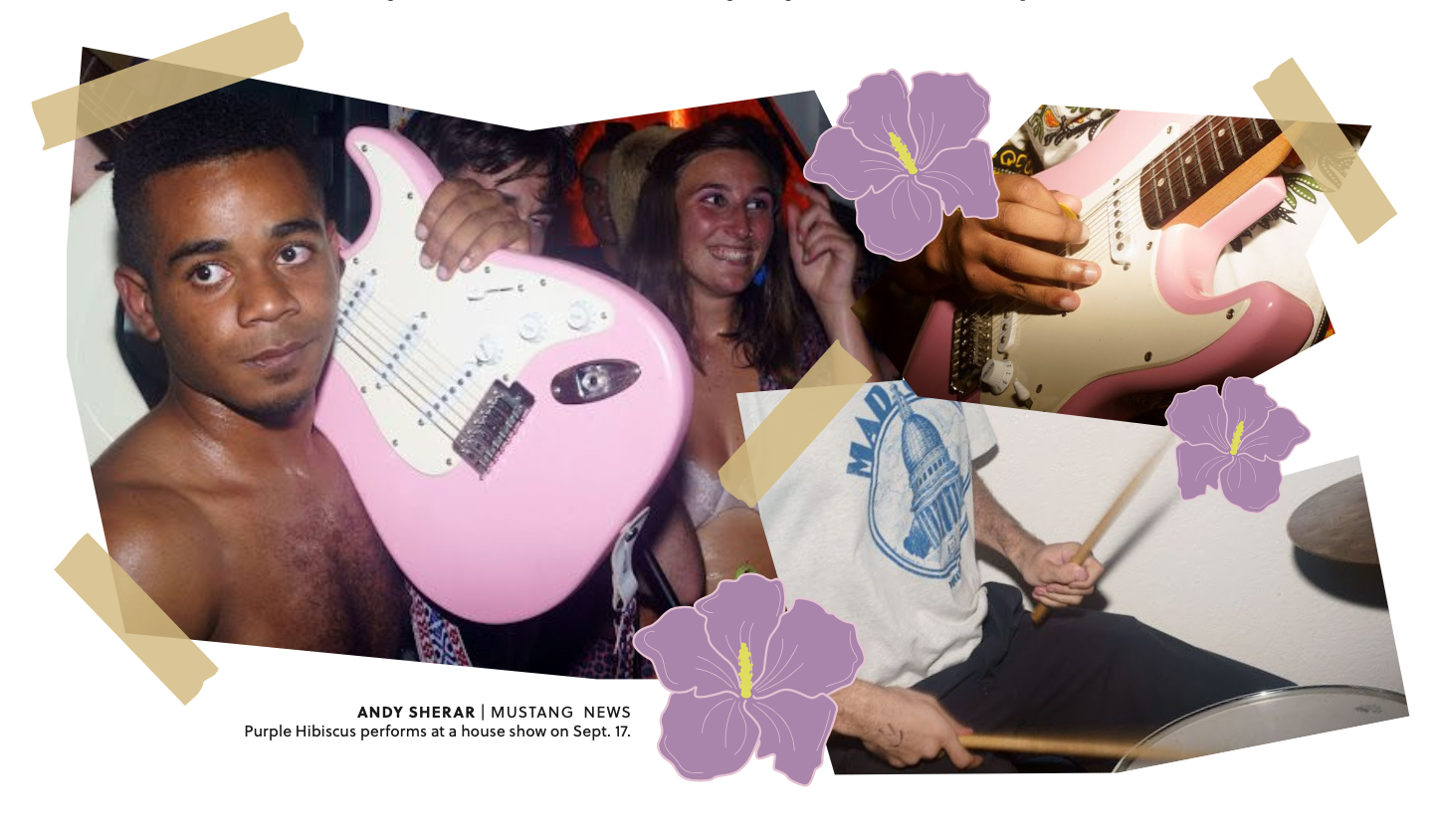A new student band — Purple Hibiscus — is bringing soul to San Luis Obispo.
The band consists of Cal Poly students Cate Armstrong, Rylan Childers, Tim Kanu, Zach Mips and UC Santa Barbara alumnus Thomas Grandoli. Their funk, soul and R&B sound is unique in San Luis Obispo’s underground indie-surf-rock music scene.
“I started Purple Hibiscus [in July] because, being a Black artist, I really want to expose the people of [San Luis Obispo] to real music by Black artists,” architectural engineering senior and guitarist Kanu said.
His roots in Nigeria inspired Kanu to pick up “the cheapest guitar at the guitar store” — a pink Fender squire — and bring his vision to life. The band’s name, Purple Hibiscus, is a nod to the Nigerian author Chimamanda Ngozi Adichie’s novel of the same title.
“[San Luis Obispo] is a very predominantly white place,” sociology senior and lead singer Armstrong said. “I’m not Black, so I can’t understand that direct experience, but getting to uplift and … allowing Black joy to be sparked within our music … allowing this band to be a route of activism …this is what we need.”
Breathing new life into the work of Black music giants like Nina Simone, Curtis Mayfield, Aretha Franklin and Sister Sledge is a way for Kanu and Black people in San Luis Obispo to express racial identity, Kanu said.
Kanu credits local surf-rock band Couch Dog and its creator, manufacturing engineering senior Max Ferrer, for his musical performance origin story. His first show took place in the Graphic Arts building, when a group of bands broke in to play a secret concert after hours.
“Everyone was moshing, and I was like, ‘wow, I could get used to this,’” Kanu said. “Other guitarists from other bands, they came and they shook my hand, and they’re like, ‘Bro, you shred.’ This is some rockstar shit.”
Couch Dog presented an opportunity for Kanu to prove himself, he said.
“So every day, I would wake up, I would practice scales and music theory,” Kanu said. “I remember staying late in [architecture] studio and just dying to get out to practice.”
Due to a combination of a heavy course load, work, the COVID-19 pandemic and a longing to progress to a “new level” of music beyond indie rock, Kanu grew away from Couch Dog.
However, R&B and soul drew Kanu back into music and inspired him to form his own band, he said.
Architectural engineering senior and bassist Mips connected with Kanu through a mutual friend, and construction technology junior Childers hopped on drums. UC Santa Barbara music theory alumnus Thomas Grandoli, known to his bandmates as “The Professor,” plays keyboard.
The final puzzle piece to fall into place was finding a lead singer.
On an unassuming bike night, Kanu struck up a conversation with Armstrong. They instantly bonded over a shared passion for music and Kanu said he was elated to discover Armstrong’s instrument of choice was her voice.
“It was like a match made in heaven,” Armstrong said.
“It was kismet,” Kaneu said. “Cate is one of the main reasons why this band was able to get started.”
Purple Hibiscus’s first show took place at Armstrong’s house. She was a major supporter of his activist-based vision for the band, according to Kanu.
Purple Hibiscus also hosted a gig on Sept. 17, and Kanu said their show had “record high attendance” for twice their usual price of admission.
Purple Hibiscus is quickly gaining speed, but Kanu believes this is just the beginning.
The music scene is coming back to life as vaccinations increase and Purple Hibiscus is gaining a following, with hundreds of Instagram followers already.
“I was getting a haircut, and these two girls spotted me from the sidewalk,” Childers said. “They ran in and they were like, ‘Hey, you’re in Purple Hibiscus.’ I didn’t know them … [Then] there were two people that showed up [to a show] and they had painted their shirts to say Purple Hibiscus. That’s very rewarding.”
With a growing fanbase, Armstrong described the band as collaborative between its members and the audience.
“Performing is such a conversation between the band and the crowd,” Armstrong said. “We are mutually benefiting each other. [People] need to feel that music right now.”
This article originally appeared in the October print edition of Mustang News.


